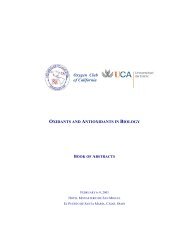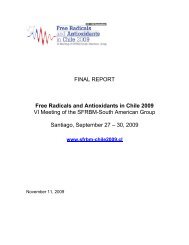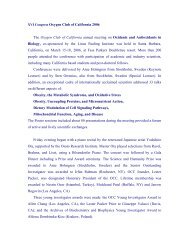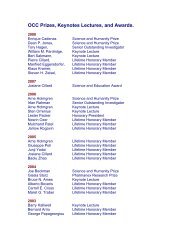PROGRAMME SCIENTIFIQUE - Oxygen Club of California
PROGRAMME SCIENTIFIQUE - Oxygen Club of California
PROGRAMME SCIENTIFIQUE - Oxygen Club of California
You also want an ePaper? Increase the reach of your titles
YUMPU automatically turns print PDFs into web optimized ePapers that Google loves.
OP29<br />
Complex relationships between smoking, physical activity and oxidant stress :<br />
Smoking negates the beneficial effects <strong>of</strong> exercise training in human.<br />
Denis Blache<br />
Centre de Recherche Inserm UMR 866, Faculté de Médecine, 7 boul. Jeanne d’Arc 21079 Dijon France<br />
e-mail : dblache@u-bourgogne.fr<br />
Amongst several lifestyle habits physical exercise and smoking have a significant influence on the risk <strong>of</strong><br />
major vascular thrombotic events. These factors have in common to tackle the redox balance. It is<br />
wellknown that physical exercise produces reactive oxygen species (ROS) that could be exacerbated<br />
during vigorous exercise. However, regular exercise without exhaustion is associated with a reduced ROS<br />
production and with an overall decreased risk <strong>of</strong> cardiovascular diseases. In previous studies, we have<br />
shown that cigarette smoking is associated with increased platelet activation and impaired redox status in<br />
humans. Smoking has also been reported to release large amounts <strong>of</strong> ROS which were proposed to<br />
represent a potential mechanistic link between cigarette smoking and cardiovascular diseases. The<br />
increased oxidant stress observed in smokers may be due to the lower blood antioxidants usually<br />
observed in smokers. Numerous key parameters involved in pro-atherothrombotic effects <strong>of</strong> smoking<br />
such as fibrinogen, interleukin-6, platelet activation, LDL-cholesterol, oxidant stress biomarkers, etc…<br />
might be favorably modified by regular endurance exercise. Therefore, the commonly accepted idea that<br />
exercise would normalize smoking-induced alteration <strong>of</strong> biological parameters has not received<br />
experimental-based evidence. On the contrary, recent work clearly indicated that postprandial oxidant<br />
stress was reported to be exacerbated in cigarette smokers.<br />
In the present study, we thus compared oxidant stress biomarkers in 146 healthy subjects before and after<br />
a 20-week exercise training program. Basal levels <strong>of</strong> antioxidants and oxidant stress markers were altered<br />
between non-smokers and smokers. These data were compatible with an increase in oxidized lipids and<br />
proteins in smokers. Exercise improved several parameters in non-smokers although it did not modify the<br />
LDL oxidation parameters. Significantly increased resistance was observed in the free radical–induced<br />
hemolysis in non-smokers. We found a general improvement in the antioxidant status following the<br />
exercise training session in non-smoking subjects. This effects was not observed in smokers specially in<br />
men. From our data, we can conclude that smoking negates the beneficial effects <strong>of</strong> exercise training.








